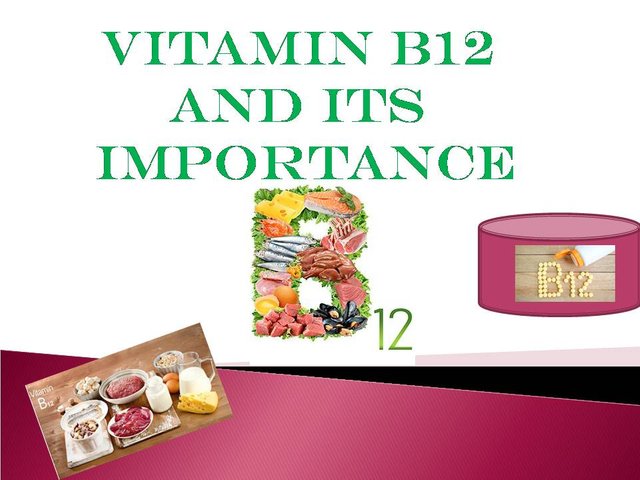Description of Vitamin B12 and its importance.
Community of @steemit, vitamin B12 is a very important substance for the health of the brain, the nervous system, the synthesis of DNA and the formation of blood cells. In fact, it is food for the brain.
source

Its use is essential at any age, but especially when the body is aging: vitamin B12 deficiency is associated with cognitive decline. Even a moderate deficiency can lead to a decrease in mental capacity and chronic fatigue. One of the most important vitamins for vegetarians, since the greatest amount is found in animal products.
The need for vitamin B12 increases when:
- Older people often reduce the secretion of hydrochloric acid in the stomach (which leads to a decrease in the absorption of vitamin B12), as well as an increase in the amount of bacteria in the intestine, which can lower the level of vitamin available for the body.
- When you have atrophic gastritis, which reduces the body's ability to absorb vitamin B12 natural food.
- In case of malignant (pernicious) anemia, there is no substance in the body that helps absorb B12 from the alimentary canal.
- During gastrointestinal operations the body loses cells that secrete hydrochloric acid and contain an internal factor that promotes the absorption of B12.
- In people with a diet that does not contain products of animal origin; as well as in babies whose nursing mothers adhere to vegetarianism or veganism.
In all the above cases, the body may have vitamin B12 deficiency, which can have very serious consequences. For the prevention and treatment of these conditions, doctors prescribe the intake of synthetic vitamins orally or in the form of injections.
Vitamin B12 is a complete group of substances that contain cobalt. It contains cyanocobalamin, hydroxocobalamin, methylcobalamin and cobamamide. Cyanocobalamin is the most active in the human body. This vitamin is considered the most complex in its structure, compared to other vitamins.
Vitamin B12 participates in the formation of genes, protects the nerves and helps in metabolism. However, for this water-soluble vitamin to work properly, it must be consumed and absorbed properly. Several factors contribute to this.
In food, vitamin B12 is combined with a specific protein that, under the influence of gastric juice and pepsin, dissolves in the human stomach. When B12 is released, the binding protein binds to it and protects it while it is transported to the small intestine. Once the vitamin is in the intestine, a substance called "internal factor B12" separates the vitamin from the protein. This allows vitamin B12 to enter the bloodstream and perform its functions.
For B12 to be properly absorbed by the body, the stomach, small intestine and pancreas must be healthy. In addition, a sufficient amount of intrinsic factor must be produced in the gastrointestinal tract. Drinking large amounts of alcohol can also affect the absorption of vitamin B12, since the production of gastric acid decreases.
Foods rich in vitamin B12 are good for eating with black pepper. Piperine, a substance found in pepper, helps the body absorb B12. As a rule, we are talking about meat and fish dishes.
Studies show that consuming the proper ratio of folic acid and B12 can improve health, strengthen the heart and reduce the risk of developing Alzheimer's disease; however, if the acid is too much, it can interfere with the absorption of B12 and vice versa. Therefore, maintaining the optimal amount of each of them is the only way to prevent the occurrence of a deficit. Folic acid is rich in leafy green vegetables, beans and broccoli, and B12 is found mainly in animal products such as fish, organic and lean meats, dairy products and eggs.
Like any other vitamin, B12 is best obtained from natural sources. There are studies that synthetic food additives can harm the body. In addition, only a doctor can determine the exact amount of a substance necessary for health and well-being.
Make sure you have a good source of vitamin B12 in your diet, such as fortified foods or dietary supplements. As a general rule, it is not enough to consume only eggs and dairy products.
Health benefits of vitamin B12:
Possible preventive effect of cancer: vitamin deficiency leads to problems with the metabolism of folic acid. As a result, the DNA can not reproduce properly and is damaged. Experts believe that damaged DNA can directly contribute to the formation of cancer. The addition of vitamin B12 to the diet along with folic acid is being researched as a way to help prevent and even cure certain types of cancer.
Promotes brain health: it has been observed that low levels of vitamin B12 increase the risk of developing Alzheimer's disease in older men and women. B12 helps maintain low levels of homocysteine, which may play a role in the development of Alzheimer's disease.
It can prevent depression: numerous studies have shown a correlation between depression and vitamin B12 deficiency. This vitamin is necessary for the synthesis of neurotransmitters associated with the regulation of mood.
Prevention of anemia and healthy blood formation: vitamin B12 is necessary for the healthy production of red blood cells, of normal size and maturity. Immature and inadequate red blood cells can lead to lower levels of oxygen in the blood, common symptoms of weakness and exhaustion.
Maintaining an optimal level of energy: as one of the B vitamins, vitamin B12 helps to convert proteins, fats and carbohydrates into "fuel" for our body. Without it, people often experience chronic fatigue. Vitamin B12 is also needed for the transmission of neurotransmitter signals, which help muscles contract and maintain energy levels throughout the day.
Yes, I always tell anyone who asked me that vitamin B12 is one of the most important supplement especially if you are a vegetarian. Since you will be consuming less meat for B12 then you would have to take a supplement for it. Megaloblastic anaemia is a real deal and can affect our quality of life.